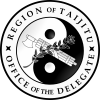Difference between revisions of "Template:Current featured article"
From Taijitu
Funkadelia (Talk | contribs) m |
Funkadelia (Talk | contribs) |
||
| Line 1: | Line 1: | ||
[[image: DelegateSeal.png|left|100px|Seal of the Delegate of Taijitu]] | [[image: DelegateSeal.png|left|100px|Seal of the Delegate of Taijitu]] | ||
| − | The ''' | + | The '''Cabinet of Taijitu''' is the body responsible for administering [[Taijitu]]'s executive government. It is primarily composed of a number of ministers appointed by the [[Delegate]] to assist them, but is also considered to include the Delegate themselves and the [[Lieutenant Delegate]]. The ministers of the Cabinet are responsible for running certain ministries tasked with different executive functions. These ministries and their duties are regulated by the [[Ministries Act]]. There is no limit on how long a minister may serve, but they may be removed by the Delegate or a vote of the Senate. The Cabinet currently contains four members and administers five ministries. |
| − | + | ||
| − | There | + | |
:Main article: [[Delegate of Taijitu]] | :Main article: [[Delegate of Taijitu]] | ||
Revision as of 20:37, 18 June 2012
The Cabinet of Taijitu is the body responsible for administering Taijitu's executive government. It is primarily composed of a number of ministers appointed by the Delegate to assist them, but is also considered to include the Delegate themselves and the Lieutenant Delegate. The ministers of the Cabinet are responsible for running certain ministries tasked with different executive functions. These ministries and their duties are regulated by the Ministries Act. There is no limit on how long a minister may serve, but they may be removed by the Delegate or a vote of the Senate. The Cabinet currently contains four members and administers five ministries.
- Main article: Delegate of Taijitu
